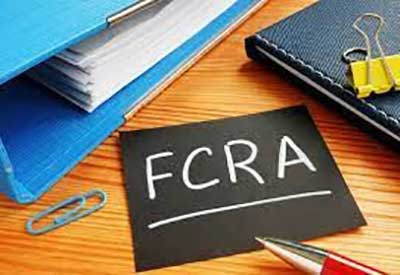Relevance: GS-2: Development processes and the development industry —the role of NGOs, SHGs, various groups and associations, donors, charities, institutional and other stakeholders.
Relevance: GS-3: Indian Economy and issues relating to planning, mobilization, of resources, growth, development; Role of external state and non-state actors in creating challenges to internal security.
Key Phrases: Foreign Contribution Regulation Act (FCRA), NGOs, Voluntary organisations, foreign donations, Internal Security and Sovereignty, Impact on economic development.
Why in News?
- Recently, the Supreme Court upheld amendments introducing restrictions in the Foreign Contribution Regulation Act (FCRA) while holding that no one has a fundamental or absolute right to receive foreign contributions.
- The court reasoned that unbridled inflow of foreign funds may destabilise the sovereignty of the nation.
What are the new amendments in FCRA highlighted by the Editorial?
- Bar on using operational FCRA accounts to receive foreign contributions.
- Mandatory production of the Aadhaar card for registration under the FCRA.
- Amendments require NGOs and recipients to open a new FCRA account at a specified branch of the State Bank of India in New Delhi as a “one-point entry” for foreign donations.
- Prohibition for public officials in receiving foreign donations.
What are the petitioners' arguments against the amendments?
- The petitioners, including individuals and NGOs engaged in cultural, educational, religious activities, argued that the amendments suffered from the “vice of ambiguity, over-breadth or over-governance” and violated their fundamental rights.
- Petitioners said the new regime amounts to a blanket ban on the capacity of intermediary organisations in India to distribute foreign donations to smaller and less visible NGOs.
What are the Supreme Court arguments in justification of the amendments ?
- Supreme Court Counter Argument: ‘Strict regulatory framework’ doesn't
mean Prohibition :
- The Supreme court countered that the amendments only provide a strict regulatory framework to moderate the inflow of foreign funds into the country.
- Apex Court further added that “No one can be heard to claim a vested right to accept foreign donations, much less an absolute right”.
- Free and uncontrolled inflow of foreign funds has the potential to impact the socio-economic structure and polity of the country.
- ‘Look within country’: No scarcity of Funds within the country
- The court said charity could be found at home. NGOs could look within the country for donors.
- The inflow of foreign contribution in the country ought to be at the minimum level, if not completely eschewed. The influence may manifest in different ways, including in destabilizing the social order within the country.
- Fundamental rights have to give way in larger public interest to the need to insulate the democratic polity from the “adverse influence of foreign contributions”.
- Over-reliance on Foreign Funds Against the philosophy of Self
Reliance:
- The Supreme Court said that unregulated inflow of foreign donations would only indicate that the government was incapable of looking after its own affairs and needs of its citizens.
- The court noted how 19,000 certificates of registration under the FCRA were cancelled for violating statutory compliances. The annual inflow of foreign contribution had almost doubled between the years 2010 and 2019.
- There was a spurt of criminal investigations on Foreign donations used for criminal offences.
- Phenomenon of re-routed: Successive transfers and creation of a layered trail of money had made it difficult to trace the flow and final utilisation of foreign donations despite the “firm regime” in place since 2010.
- Court addressed that the amendments do not prohibit inflow of foreign contributions, but are a regulatory measure to permit acceptance by registered persons or persons having prior permission to do so with condition that they must themselves utilise the entire contribution.
- ‘Continual Supervision’ and 'Reasonable Restrictions' are vital:
- The court held that the restrictions in the amendments were “reasonable” and “founded on intelligible criteria”. It fixed accountability on the recipients, increased the efficacy of “continual supervision” over foreign contributions.
- However, the court read down one of the provisions — Section 12 (A) — of the 2020 Amendment Act, which mandated the production of Aadhaar card for registration.
- The Bench allowed the office-bearers of NGOs to use their Indian passports as an identification document.
Conclusion
- Court very well said that “Philosophically, foreign contribution (donation) is akin to gratifying intoxicant replete with medicinal properties and may work like a nectar. However, it serves as a medicine so long as it is consumed (utilised) moderately and discreetly, for serving the larger cause of humanity.
- Otherwise, this artifice has the capability of inflicting pain, suffering and turmoil as being caused by the toxic substance (potent tool) — across the nation.
Source: The Hindu BL
Mains Question:
Q. As said by the Supreme Court, "No one has a fundamental or absolute right to receive foreign donations". In this context, discuss the recently done amendments in Foreign Contribution Regulation Act (FCRA) to streamline the flow of foreign donations. (10 marks).









